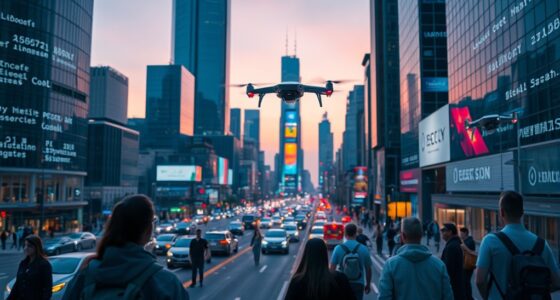OpenAI has reversed its strict copyright enforcement policies for Sora after community feedback and legal concerns. You’ll notice that automated takedown measures have been removed, and now, claims are evaluated on a case-by-case basis. This change aims to balance protecting creators’ rights while allowing more creative freedom and innovation. If you keep exploring, you’ll discover how this shift impacts users and the industry alike.
Key Takeaways
- OpenAI removed automated copyright takedown measures for Sora after community backlash.
- The company shifted to case-by-case evaluations to better recognize fair use.
- Transparency and clearer dispute processes were introduced to build trust.
- The policy reversal aimed to balance legal compliance with fostering creativity.
- This change influenced broader industry efforts toward responsible AI content enforcement.

OpenAI has reversed its stance on copyright enforcement for Sora, an AI content generation tool once subject to strict restrictions. Originally, OpenAI implemented rigorous measures to protect copyrighted material, including issuing takedown notices and restricting access for outputs flagged as violations. These actions relied heavily on automated detection systems that scanned Sora’s outputs for copyrighted text, leading to the removal of user-generated content and limiting creative possibilities. The policy was driven by a desire to uphold the rights of original content creators and comply with legal frameworks like the DMCA, but it also sparked significant community criticism. Many users felt the enforcement was overly harsh, stifling innovation and making it difficult to develop derivative works or educational projects using Sora.
The backlash prompted OpenAI to reconsider its approach. Feedback from users emphasized the need for a more balanced policy that recognizes fair use and the nuances of AI-generated content. Legal uncertainties surrounding copyright protections for AI outputs added to the complexity, prompting internal reviews of enforcement practices. OpenAI recognized that overreliance on automated flags often led to inaccuracies and unintended censorship, undermining trust within its user base. The company aimed to strike a better balance—protecting rights without hampering creativity or progress in AI content development. This shift was also motivated by a desire to improve public relations and foster a more collaborative relationship with the community.
Following the reversal, OpenAI removed automated takedown measures specific to Sora-generated content. The new policies clarify that AI outputs will not be automatically flagged for copyright issues, instead encouraging case-by-case evaluations of claims. Transparency increased, providing clearer guidelines and more accessible recourse options for users facing disputes. OpenAI also committed to ongoing dialogue with copyright holders and the AI community, emphasizing a flexible, adaptive approach. As a result, users regained confidence in creating derivative works with Sora, leading to increased experimentation and innovation. Industry experts see this move as a positive step toward more responsible and balanced handling of AI-generated content. The reversal has also prompted other AI developers to reconsider their enforcement policies, signaling a broader shift in how copyright issues are addressed within the evolving AI landscape. Additionally, the decision highlights the importance of content moderation strategies that balance legal compliance with creative freedom.
Frequently Asked Questions
How Will This Decision Impact Future Copyright Policies?
Your future copyright policies will likely become more precise and rights holder-friendly. Expect more AI platforms to adopt opt-in models, requiring explicit permissions before using copyrighted characters. This shift encourages legal compliance and reduces infringement risks. You’ll see clearer licensing frameworks and possibly new revenue-sharing arrangements that reward content creators. Overall, these changes promote responsible AI use, balancing innovation with stronger protections for intellectual property rights, shaping a more trustworthy industry landscape.
Will There Be New Licensing Agreements for Sora Content?
Yes, there will be new licensing agreements for Sora content, acting like a carefully woven safety net. OpenAI’s shift to opt-in copyright controls means you can now choose which IP to license or block. These agreements will likely include monetization options, usage scope, and enforcement measures, giving content creators more control. This move opens a new chapter, where collaboration and respect for IP become the guiding stars.
How Does This Change Affect Users’ Access to Copyrighted Materials?
This change limits your access to copyrighted materials in Sora videos. You now need explicit permission from rights holders to generate content featuring their characters, which makes it harder to use popular IP without approval. As a result, you’ll see fewer fan-created videos with well-known characters, and some prompts may be blocked entirely. Overall, your ability to freely create with copyrighted content decreases, giving rights holders more control over how their work is used.
What Prompted Openai to Reverse Its Enforcement Stance?
OpenAI reversed its enforcement stance because of the rapid user backlash and legal pressure from copyright holders. When unauthorized videos with copyrighted characters flooded the platform, it became clear the initial opt-out policy was ineffective. To protect itself from costly lawsuits and satisfy rights owners, OpenAI switched to an opt-in model, giving creators and rights holders more control, and announced plans for revenue sharing and better safeguards.
Are There Plans to Revisit Other Copyright Enforcement Policies?
Like a ship adjusting its sails, OpenAI may revisit other copyright enforcement policies soon. While no concrete plans are public yet, the recent Sora reversal signals openness to change based on community and rights-holder feedback. You should watch for potential expansions of rights-holder controls, revenue-sharing, or data sourcing policies. Staying informed will help you adapt to evolving regulations and guarantee your compliance with future policy updates.
Conclusion
So, you see, OpenAI’s sudden shift in copyright enforcement on Sora feels like a seismic event in the AI world. You might think the company’s about-face saves the day, but it also leaves us wondering if they’ll stick to their promises next time. For now, you can breathe a little easier, knowing that the future of AI and copyright is still unpredictable — like a roller coaster that keeps surprising you at every turn.









